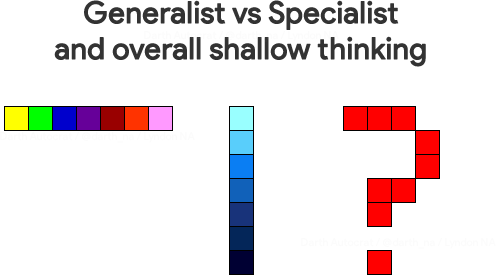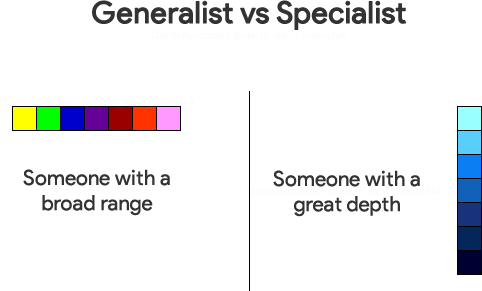
🧵
::: That's "Real Intent" :::
The article by @LogansNotions is more than worth a read (well written and informative).
But it does raise a point that is beginning to irk me.
"INTENT" is not just a buzz word!
#SEO #intentalosopita
🧵>>>
::: That's "Real Intent" :::
The article by @LogansNotions is more than worth a read (well written and informative).
But it does raise a point that is beginning to irk me.
"INTENT" is not just a buzz word!
#SEO #intentalosopita
🧵>>>
https://twitter.com/LogansNotions/status/1480570354707820544
>>>
I don't think people realise just how long/established the idea of "searcher intent" (or "query intent") is.
We've had several cycles of it over the past decade,
and it's older than that!
More importantly, it's a core aspect of Marketing/Sales.
>>>
I don't think people realise just how long/established the idea of "searcher intent" (or "query intent") is.
We've had several cycles of it over the past decade,
and it's older than that!
More importantly, it's a core aspect of Marketing/Sales.
>>>
>>>
Intent isn't just:
* purpose
* goal
It includes:
* reason
* motivation
Someone may be searching for Pizza.
That may trigger Local, as well as a possible hybrid of Commercial/Informational.
But they are searching for Pizza for a reason (hungry. to bake later etc.).
>>>
Intent isn't just:
* purpose
* goal
It includes:
* reason
* motivation
Someone may be searching for Pizza.
That may trigger Local, as well as a possible hybrid of Commercial/Informational.
But they are searching for Pizza for a reason (hungry. to bake later etc.).
>>>
>>>
This is why research and analysis are important.
It's not just "keywords".
It's not just "modifiers" or "complimentors".
It's physical, mental and emotional needs/wants - drivers.
>>>
This is why research and analysis are important.
It's not just "keywords".
It's not just "modifiers" or "complimentors".
It's physical, mental and emotional needs/wants - drivers.
>>>
>>>
The words you target carry some info - but it may vary.
"Handbags" = noun > product
... so commercial/transactional
"Best" = modifier > comparison/advisory
... so shifts towards information/comparative (likely hybrid with C/T).
>>>
The words you target carry some info - but it may vary.
"Handbags" = noun > product
... so commercial/transactional
"Best" = modifier > comparison/advisory
... so shifts towards information/comparative (likely hybrid with C/T).
>>>
>>>
But the SERP content can improve your accuracy.
1) The results can inform you what G thinks/sees users are after
2) The features (ads, FS, PAA, KP etc.) can show what people/G think you want too
Between "word" and "SERP" you can get a good picture ...
>>>
But the SERP content can improve your accuracy.
1) The results can inform you what G thinks/sees users are after
2) The features (ads, FS, PAA, KP etc.) can show what people/G think you want too
Between "word" and "SERP" you can get a good picture ...
>>>
>>>
... of what is already there.
Sometimes, that's sufficient.
But if you stop there - you aren't doing it properly!
You need to adjust/expand the query; look at additional phrasings, look at deeper motivations.
>>>
... of what is already there.
Sometimes, that's sufficient.
But if you stop there - you aren't doing it properly!
You need to adjust/expand the query; look at additional phrasings, look at deeper motivations.
>>>
>>>
This not only helps you with discovering,
but with comprehension.
Every single piece of content (page, image, video etc.),
should contribute towards a business goal,
and a user-goal.
There's a wealth of established stages (funnel/journey), and pain points/motivators!
>>>
This not only helps you with discovering,
but with comprehension.
Every single piece of content (page, image, video etc.),
should contribute towards a business goal,
and a user-goal.
There's a wealth of established stages (funnel/journey), and pain points/motivators!
>>>
>>>
Awareness > Interest > Decision > Conversion
or
Awareness > Education > Interest > Consideration > Comparison > Rationalisation > Conversion
and then
Cultural, Social, Personal, Psychological
or
Status, Fear, Comfort, Safety, Satisfaction, Advantage
etc.
>>>
Awareness > Interest > Decision > Conversion
or
Awareness > Education > Interest > Consideration > Comparison > Rationalisation > Conversion
and then
Cultural, Social, Personal, Psychological
or
Status, Fear, Comfort, Safety, Satisfaction, Advantage
etc.
>>>
>>>
So when you do your research - you should be looking at whatever model/list seems to suit your market/business/prospects (or audience).
You should be considering content (and researching!) for each stage, and motivation.
If you're not, you are likely missing out!
>>>
So when you do your research - you should be looking at whatever model/list seems to suit your market/business/prospects (or audience).
You should be considering content (and researching!) for each stage, and motivation.
If you're not, you are likely missing out!
>>>
>>>
This is why knowing your audience is so important.
It's not just:
* what words are they searching
but also:
* why are they searching
* what do they want to find
and then (ideally):
* what format/medium suits them
* what language/level
>>>
This is why knowing your audience is so important.
It's not just:
* what words are they searching
but also:
* why are they searching
* what do they want to find
and then (ideally):
* what format/medium suits them
* what language/level
>>>
>>>
If it helps, think of times when You are the prospect.
You have likely searched for something on line ...
... and likely got frustrated/irritated with the results.
You've had to alter the query,
or click multiple items in the SERPs.
Why?
>>>
If it helps, think of times when You are the prospect.
You have likely searched for something on line ...
... and likely got frustrated/irritated with the results.
You've had to alter the query,
or click multiple items in the SERPs.
Why?
>>>
>>>
Because the words you originally used weren't specific enough?
Because the content you found was weak/lame?
Because the problem the content addresses didn't quite match your problem?
Because the content was insufficient/covered different aspects?
>>>
Because the words you originally used weren't specific enough?
Because the content you found was weak/lame?
Because the problem the content addresses didn't quite match your problem?
Because the content was insufficient/covered different aspects?
>>>
>>>
Be considerate of the user,
think from their perspective,
understand their need.
It's not just "words"!
There are "feelings" and "thoughts" you have to address!
Be considerate of the user,
think from their perspective,
understand their need.
It's not just "words"!
There are "feelings" and "thoughts" you have to address!
• • •
Missing some Tweet in this thread? You can try to
force a refresh








